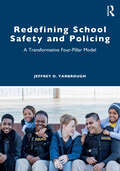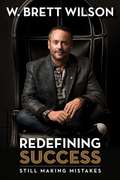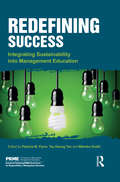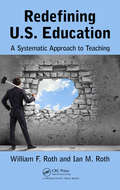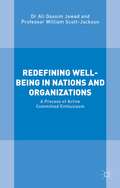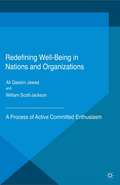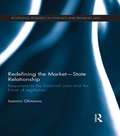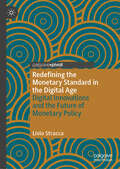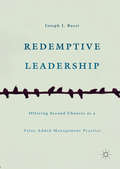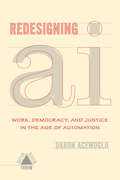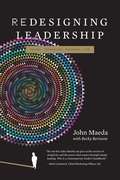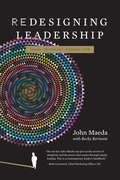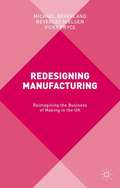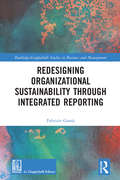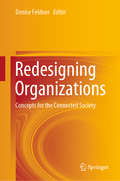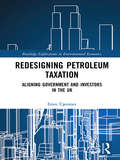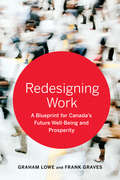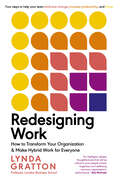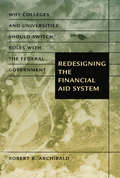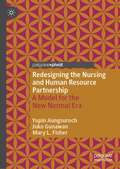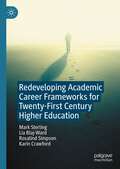- Table View
- List View
Redefining School Safety and Policing: A Transformative Four-Pillar Model
by Jeffrey D. YarbroughRedefining School Safety and Policing identifies and works to eliminate systemic issues in school policing that negatively impact students of color, LGBTQIA+ students, and other marginalized populations. Focusing on the fundamental goal of creating safe learning environments, Yarbrough lays out the unintended consequences of involving police in the administrative disciplinary process, as agents of school administrators and enforcers of zero-tolerance policies. Behavioral health support is important to students going through social, emotional, and mental health crises. True equity work brings everyone to a safe space in the middle, encouraging open discussion and courageous dialogue and aiming to create positive change. Yarbrough argues that behavioral health and racial equity are vital to transforming school policing and providing beneficial alternative solutions to school policing that do not lead students to the juvenile or criminal justice system. This book is suitable for colleges and universities, K-12 school administrators, teachers, police and school resource officers, counselors, social workers, and community activists.
Redefining Success
by W Brett WilsonW. Brett Wilson, Dragons' Den co-star and Risky Business host, often gets asked about his secrets to success. He became one of Canada's top investment bankers because he was driven, willing to take risks and saw opportunity where others saw roadblocks. But along the path to business success, he tripped over a multitude of misguided priorities. For many years, Wilson pursued business with uncompromising focus, working long hours, seven days a week. In the process, his marriage and his health suffered greatly: he was rarely home as his children were growing up, divorce became inevitable and cancer struck at age forty-three. He truly learned the hard way that one can find financial success and the respect of business peers while almost losing what matters most: health, family and friends. Redefining Success details how Wilson was forced to redefine his life, making health and key relationships his first priorities. Through trial and error, he discovered that these simple virtues are foundational for real, enduring success, both in business and in life. Wilson's compelling insights are the basis for Redefining Success. Not just for entrepreneurs and business people, the book outlines how we can change our lives for the better by re-evaluating our personal definitions of success, then reworking them into a life plan that is feasible, lasting and rewarding. Inspirational and paradigm-changing, Redefining Success will help you implement and sustain lasting, positive change in your life--and make your world a little more meaningful--everyday.
Redefining Success
by W. Brett WilsonW. Brett Wilson, Dragons' Den co-star and Risky Business host, often gets asked about his secrets to success. He became one of Canada's top investment bankers because he was driven, willing to take risks and saw opportunity where others saw roadblocks. But along the path to business success, he tripped over a multitude of misguided priorities. For many years, Wilson pursued business with uncompromising focus, working long hours, seven days a week. In the process, his marriage and his health suffered greatly: he was rarely home as his children were growing up, divorce became inevitable and cancer struck at age forty-three. He truly learned the hard way that one can find financial success and the respect of business peers while almost losing what matters most: health, family and friends.
Redefining Success: Integrating Sustainability into Management Education (The Principles for Responsible Management Education Series)
by Patricia M. Flynn Tay Keong Tan Milenko GudićRedefining Success: Integrating Sustainability into Management Education advocates incorporating sustainability concepts that go beyond the financial ‘bottom line’ into management education and business practice. Highlighting the UN Global Compact (UNGC), the Principles for Responsible Management Education (PRME) and the Sustainability Development Goals (SDGs), it explores conceptual and practical issues, presents case studies and other empirical evidence, and offers solutions that will both encourage and assist management educators in the incorporation of sustainability into their courses and research. incorporating sustainability into their courses and research. Written by 34 individuals from 17 countries, the book addresses these topics from a variety of theoretical, disciplinary, geographic and organizational perspectives. The authors demonstrate how management educators, collaborating with business and civic organizations, can be change agents for a better world. Written for educators, scholars and business practitioners, the volume concludes with lessons learned, challenges encountered, and implications for responsible management education.
Redefining U.S. Education: A Systematic Approach to Teaching
by William F. Roth Ian M. RothA growing number of educators are beginning to believe that as we move into a different kind of world with different possibilities, the traditional approach to teaching is no longer the most productive. They are beginning to understand that if we are to continue progressing as a nation, we need to place more emphasis on the development of each stud
Redefining Well-Being in Nations and Organizations: A Process of Active Committed Enthusiasm
by Ali Qassim Jawad William Scott-JacksonRedefining Well-Being in Nations and Organizations.
Redefining Well-Being in Nations and Organizations: A Process of Improvement
by William Scott-Jackson Ali Qassim JawadRedefining Well-Being in Nations and Organizations is an essential book for researchers, policy makers and managers. It provides a new multi-disciplinary perspective on wellbeing and engagement, reviewing the latest research from several previously unrelated disciplines to develop a process for active committed enthusiasm (PACE), encompassing theory and clarifying the definitions of, and relationships between, wellbeing, engagement and related concepts. PACE allows researchers to model causal relationships, and policy makers and managers to analyze the potential impact of possible interventions. It demonstrates that, as nations, organizations and individuals fulfil their basic material needs, the impact of individual optimism, and other aspects of positive psychology, become paramount in maximizing wellbeing and engagement.
Redefining the Market-State Relationship: Responses to the Financial Crisis and the Future of Regulation (Routledge Research in Finance and Banking Law)
by Ioannis GlinavosThis book offers an interdisciplinary overview of the role of law in modern capitalism in the context of financial crisis. In this work, the reader will find a discussion of key issues relevant to the crisis that have occupied the pages of the financial press since 2007 including an assessment of the meltdown of the sub-prime mortgage market, the credit crunch, the European debt crisis and the turmoil in Greece, plus a series of theoretical contributions that are aimed to challenge perceptions of the market-state relationship and the place of law within it. The book includes a methodological defence of the state-market dichotomy, a critique of the tenets of neoclassical economics, and an evaluation of what the financial crisis heralds for the future of the political economy of western democracies. Ioannis Glinavos argues that it is a mistake to associate markets with freedom and states with oppression, and suggests that more choice for consumers can -and does- mean less choice for citizens. The book suggests that a new social contract is needed to ensure the survival of both capitalism and democracy. In contributing a unique, legal perspective to the underlying dynamics of the financial crisis, this book will be valuable to scholars and students of regulation, financial markets and economic development.
Redefining the Monetary Standard in the Digital Age: Digital Innovations and the Future of Monetary Policy
by Livio StraccaThis book discusses the future of money and monetary policy in an increasingly digital world. Despite the rise of digital currency, the monetary regime, with its key features centered on fiat money, has remained essentially unchanged since the collapse of the Bretton Woods system in the 1970s. This book explains the economics of money in a digital world in simple terms and plain language built on the most recent academic literature. While the book considers a scenario of continuity where change is more cosmetic than real, it also envisages a very different monetary future to the one that exists now. By drawing on research and policy, the book offers predictions on the monetary future and outlines a vision for money in 2050. Written by a senior central bank staff member, this insider take will be of interest to academics, students, practitioners, and policymakers interested in monetary policy and digitalization.
Redemptive Leadership
by Joseph J. BucciThis book outlines skills and behaviors for managers to adopt when offering second chance opportunities, providing the resources needed to reclaim, restore, and redirect current employees with great potential but who demonstrate terminal conduct. Based on qualitative research, it analyses incidents of successful reinstatement and improved performance by employees previously discharged for cause, citing cases that highlight the benefits of choosing to offer redemption and give employees second chances. Organizational pressure to hire and retain near-perfect employees is higher than ever, yet little research has been conducted assessing the impact of the manager's leadership behavior. This book fills that gap and provides seminal reading for faith-oriented students, scholars, managers, and human resources professionals, particularly focused on religious and secular leadership, to help foster a nurturing and redemptive environment.
Redesigning AI (Boston Review / Forum)
by Daron AcemogluA look at how new technologies can be put to use in the creation of a more just society.Artificial Intelligence (AI) is not likely to make humans redundant. Nor will it create superintelligence anytime soon. But it will make huge advances in the next two decades, revolutionize medicine, entertainment, and transport, transform jobs and markets, and vastly increase the amount of information that governments and companies have about individuals. AI for Good leads off with economist and best-selling author Daron Acemoglu, who argues that there are reasons to be concerned about these developments. AI research today pays too much attention to the technological hurtles ahead without enough attention to its disruptive effects on the fabric of society: displacing workers while failing to create new opportunities for them and threatening to undermine democratic governance itself. But the direction of AI development is not preordained. Acemoglu argues for its potential to create shared prosperity and bolster democratic freedoms. But directing it to that task will take great effort: It will require new funding and regulation, new norms and priorities for developers themselves, and regulations over new technologies and their applications.At the intersection of technology and economic justice, this book will bring together experts--economists, legal scholars, policy makers, and developers--to debate these challenges and consider what steps tech companies can do take to ensure the advancement of AI does not further diminish economic prospects of the most vulnerable groups of population.
Redesigning Leadership
by John MaedaWhen designer and computer scientist John Maeda was tapped to be president of the celebrated Rhode Island School of Design in 2008, he had to learn how to be a leader quickly. He had to transform himself from a tenured professor--with a love of argument for argument's sake and the freedom to experiment--into the head of a hierarchical organization. The professor is free to speak his mind against "the man. " The college president is "the man. " Maeda has had to teach himself, through trial and error, about leadership. In Redesigning Leadership, he shares his learning process. Maeda, writing as an artist and designer, a technologist, and a professor, discusses intuition and risk-taking, "transparency," and all the things that a conversation can do that an email can't. In his transition from MIT to RISD he finds that the most effective way to pull people together is not social networking but free food. Leading a team? The best way for a leader to leverage the collective power of a team is to reveal his or her own humanity. Asked if he has stopped designing, Maeda replied (via Twitter) "I'm designing how to talk about/with/for our #RISD community. " Maeda's creative nature makes him a different sort of leader--one who prizes experimentation, honest critique, and learning as you go. With Redesigning Leadership, he uses his experience to reveal a new model of leadership for the next generation of leaders.
Redesigning Leadership (Simplicity: Design, Technology, Business, Life)
by John MaedaLessons for a new generation of leaders on teamwork, meetings, conversations, free food, social media, apologizing, and other topics. When designer and computer scientist John Maeda was tapped to be president of the celebrated Rhode Island School of Design in 2008, he had to learn how to be a leader quickly. He had to transform himself from a tenured professor—with a love of argument for argument's sake and the freedom to experiment—into the head of a hierarchical organization. The professor is free to speak his mind against “the man.” The college president is “the man.” Maeda has had to teach himself, through trial and error, about leadership. In Redesigning Leadership, he shares his learning process. Maeda, writing as an artist and designer, a technologist, and a professor, discusses intuition and risk-taking, “transparency,” and all the things that a conversation can do that an email can't. In his transition from MIT to RISD he finds that the most effective way to pull people together is not social networking but free food. Leading a team? The best way for a leader to leverage the collective power of a team is to reveal his or her own humanity. Asked if he has stopped designing, Maeda replied (via Twitter) “I'm designing how to talk about/with/for our #RISD community.” Maeda's creative nature makes him a different sort of leader—one who prizes experimentation, honest critique, and learning as you go. With Redesigning Leadership, he uses his experience to reveal a new model of leadership for the next generation of leaders.
Redesigning Manufacturing
by Michael Beverland Beverley Nielsen Vicky PryceManufacturing in the UK has an image problem. Although this image problem is more fiction than fact, it nonetheless has an impact on the sector's ability to attract staff, capital, and policy interest. Redesigning Manufacturing seeks to redress this situation by focusing on the real successes of the sector and the strategies used by makers to achieve sustainable results. In so doing, we broaden the debate about manufacturing to encompass issues of branding, design and creativity, craft, market creation, and supportive ecosystems. Rather than viewing the future of the manufacturing sector as reliant solely on productivity improvements, the pursuit of high technology markets, and investments in science, engineering, technology and maths, this book highlight the connectedness and complexity of modern manufacturing in the UK. Drawing on these insights and the success of many Midlands-based manufacturers the authors explore a more nuanced industrial policy.
Redesigning Organizational Sustainability Through Integrated Reporting (Routledge-Giappichelli Studies in Business and Management)
by Fabrizio GranàThis book explores the role of accounting and reporting practices, such as corporate and integrated reports, as organizations attempt to represent sustainability. By relying upon the case of a large international oil and gas company and its recent development of integrated reporting, this book argues that the ambiguity of sustainability as a concept, and the impossibility to fully capture it through accounting and reporting practices, does not mean that any attempt to represent it inevitably leads to distortion or obfuscates ‘reality’. Rather, the way in which this concept is presented through accounting and reporting practices can have a constructive effect on the organization through the aspirations that these representations entail. The book demonstrates that accounting and reporting practices, such as integrated reporting, are not expected to offer complete representations of organizations’ sustainability. Rather, these practices offer a number of representations (e.g. graphs, diagrams, tables, grid) that affect the way in which organizations understand and report on sustainability, changing its meaning over time. Finally, this study demonstrates that undefined concepts, such as ‘sustainability’, and practices, such as ‘integrated reporting’, mutually construct each other. The attempt to represent sustainability within the organization and the debates that this process generates, make accounting and reporting practices unfold themselves, and evolve. The book will be of interest to scholars in the field of accounting, management and sustainability, as well as practitioners from a wide array of additional fields, such as planning and control, organizations’ strategy, business ethics, corporate social responsibility and corporate reporting.
Redesigning Organizations: Concepts for the Connected Society
by Denise FeldnerThis book offers readers a deeper understanding of the Cyberspace, of how institutions and industries are reinventing themselves, helping them excel in the transition to a fully digitally connected global economy. Though technology plays a key part in this regard, societal acceptance is the most important underlying condition, as it poses pressing challenges that cut across companies, developers, governments and workers. The book explores the challenges and opportunities involved, current and potential future concepts, critical reflections and best practices. It addresses connected societies, new opportunities for governments, the role of trust in digital networks, and future education networks. In turn, a number of representative case studies demonstrate the current state of development in practice.
Redesigning Petroleum Taxation: Aligning Government and Investors in the UK (Routledge Explorations in Environmental Economics)
by Emre ÜşenmezSince its inception some 40 years ago, petroleum-specific taxation in the UK has been subject to numerous modifications. Often these modifications were brought into place not only to sufficiently incentivise the investors but also to capture a fair share for the government. However, it is evident from the frequency of changes that finding the right balance between these two aims is no easy matter. Such a balance, and the consequent fiscal stability, is necessary for the long-term relationship between the parties to endure to their mutual benefit. Still, it does not take much for one or other party to feel that they are out of balance. As a consequence, one party feels that the other party is taking an undue proportion of the value generated and that they are losing out. Yet achieving that balance and fiscal stability is possible. To understand this possibility, this book first clarifies what is meant by sufficient incentivisation and fair share before developing a new fiscal system that manages this balance and stability. Such clarification yields objective criteria against which to assess not only the existing regime, but also the newly proposed regime. This approach is further complemented by the critical analysis of the fiscal legislative framework and the evaluation of the legal positions of specific contractual elements and mechanisms found within that framework. This latter analysis is important in order to reduce the legal uncertainty such elements may create, which can otherwise lead to further reactive amendments and revisions to the fiscal regime in the future.
Redesigning Work: A Blueprint for Canada's Future Well-being and Prosperity
by Graham Lowe Frank GravesCanada's future prosperity is of utmost concern to citizens, industry leaders and policy makers. Using original public opinion research from EKOS, Redesigning Work argues that improving people's jobs and workplaces can unlock the potential to strengthen Canada's economy and improve the well-being of Canadians. Graham Lowe and Frank Graves are two of Canada's leading experts on work and public opinion. In Redesigning Work the authors provide a blueprint for the future of work in Canada by identifying practical ways to make work more motivating, rewarding and productive. The authors provide fuel for employers, workers, policy makers, HR professionals, and NGOs to combat the negative trends many Canadians associate with their future economic prospects. The book paints an optimistic picture of the future of work by addressing job stress, work-life balance, skill use and engagement.
Redesigning Work: How to Transform Your Organization and Make Hybrid Work for Everyone (Management on the Cutting Edge)
by Lynda GrattonHow do we make the most of the greatest global shift in the world of work for a century and radically redesign the way we work—forever?Professor Lynda Gratton is the global thought-leader on the future of work. Drawing on thirty years of research into the technological, demographic, cultural, and societal trends that are shaping work and building on what we learned through our experiences of the pandemic, Gratton presents her innovative four-step framework for redesigning work that will help you: • Understand your people and what drives performance • Reimagine creative new ways to work • Model and test these approaches within your organization • Act and create to ensure your redesign has lasting benefits Gratton presents real-world case studies that show companies grappling with work challenges. These include the global bank HSBC, which built a multidisciplinary team to understand the employee experience; the Japanese technology company Fujitsu, which reimagined three kinds of &“perfect&” offices; and the Australian telecommunications company Telstra, which established new roles to coordinate work across the organization. Whether you&’re working in a small team or running a multinational, Redesigning Work is the definitive book on how to transform your organization and make hybrid working work for you.
Redesigning the Financial Aid System: Why Colleges and Universities Should Switch Roles with the Federal Government
by Robert B. ArchibaldAs the cost of higher education continues to rise, students and their families find it increasingly difficult to navigate the financial aid maze. In Redesigning the Financial Aid System, economist Robert Archibald examines the history of the system and its current flaws, and he makes a radical proposal for changing the structure of the system. Archibald argues that one of the problems with the current model—in which universities are responsible for the majority of grants while the federal government provides student loans—is that a student cannot know the final price of attending a given institution until after he or she has applied, been accepted, and received a financial aid offer. As a result, students remain largely uninformed about the cost of their college educations until very late in the decision-making process and so have difficulty making a timely choice. In addition, financial aid information is kept private, creating confusion over the price of a college education and the role of financial aid.Under Archibald's proposed reforms, the federal government would assess a student's financial need and provide need-based grants, while institutions would be responsible for guaranteeing student loans. Not only would this new system demystify financial aid and allow students to be better informed about the cost of college earlier in the process, but it would greatly simplify the application procedure and prevent financial aid allocation from contributing to the problem of rising tuition costs. Archibald's clear explanation of the current system—its impact, strengths, and weaknesses—as well as his plans for reform, will be of interest to educators, administrators, students, and parents.
Redesigning the Nursing and Human Resource Partnership: A Model for the New Normal Era
by Yupin Aungsuroch Joko Gunawan Mary L. FisherThis book focuses on the partnership between nursing and human resource management in hospital administration. In doing so, it addresses the barriers and challenges in the process of competence-based recruitment and selection, training and development, rewards and benefits, performance appraisal, career planning and development, and succession planning of nurses in the hospitals, specifically to face the new normal era. There is no doubt that the demand for nurses has been great during the COVID-19 pandemic. Nurses have become the heroes in the battle of the virus, and their hard work should be appreciated. Yet, burnout, stress, and depression among nurses have become the main issues during the pandemic. Some nurses leave their jobs and profession due to an excessive and stressful workload. This crisis puts a new focus on human resource management in hospital administration to retain their nurses, and also improve the quality of care. In addition to addressing the points above, the book also offers recommendations to resolve the barriers and challenges of competence-based human resource management by emphasizing the partnership between nursing and human recourses to influence nurse practice and human resource policy positively.
Redeveloping Academic Career Frameworks for Twenty-First Century Higher Education
by Karin Crawford Lia Blaj-Ward Rosalind Simpson Mark SterlingThis book spotlights new pathways for academic career progression beyond the traditional teaching-and-research model. It sets out key parameters for constructive conversations about alignment to these new pathways, which are examined from the point of view of individuals at different stages in their careers, as well as at an institutional level. The authors offer guidance on how to implement new pathways and how to realign professional development for academics so that the new pathways fully achieve their purpose to support universities’ contribution to society. The volume will appeal to academics in higher education, as well as those involved in the redesign and implementation of academic career frameworks from a variety of positions in a university.
Redfin
by Julia Kelley Marco Di MaggioRedfin, a technology-powered residential real estate brokerage, was founded in 2002 with the intention of using technology to disrupt the real estate industry. Over the next 15 years, Redfin made several changes to its business model. Initially, the company provided less support than a traditional real estate brokerage but helped home buyers and sellers save more money. Over time, in response to customer feedback, Redfin increased the level of customer service it provided while decreasing the amount customers saved, instead relying on its unique online tools to differentiate itself from other real estate brokerages. In July 2017, Redfin went public at a $1.73 billion valuation. Now, in late 2017, CEO Glenn Kelman had to decide what Redfin’s top strategic priority should be. Redfin could try to increase its market share, which was currently less than 2% even in the company’s top markets, or it could focus on balancing costs and improving its bottom line.
Redfin: Redefine Real Estate
by Hong Luo Huafeng YuFounded in 2004, Redfin envisioned a light-touch model in which clients self-served using the digital platform in exchange for a significantly lower fee than traditional agents. Realizing the narrow appeal of its initial model, Redfin had made significant changes to its strategy while maintaining some key distinctive choices. As of 2016, Redfin served in more than 80 markets throughout the U.S., employed over 700 full-time agents, and had grown over 40% annually since 2014. With additional capital raised through an IPO, Glenn Kelman faced decisions on how to allocate these resources in order to grow. Should Redfin adjust its advertising strategy? Should it reconsider the policy of hiring lead agents only as full-time employees? Should Redfin purchase homes and hold inventories?
Redifferentiating Products and Services: Employ an Entrepreneurial Mindset
by Rita Gunther Mcgrath Ian MacmillanThe current business environment is tumultuous and full of uncertainty. What you need is an entrepreneurial mindset--a way of thinking about your business that captures the benefits of uncertainty. The key aspect of establishing an entrepreneurial mindset is encouraging everyone to find opportunities to change your business model. This chapter focuses on redifferentiating products and services using consumption chain analysis and quizzing. This chapter is excerpted from "The Entrepreneurial Mindset: Strategies for Continuously Creating Opportunity in an Age of Uncertainty."
